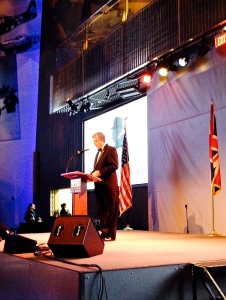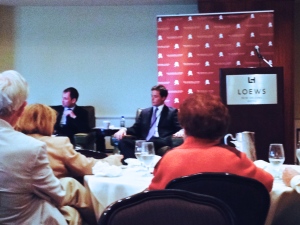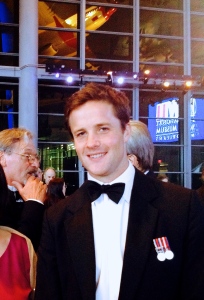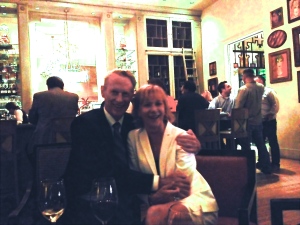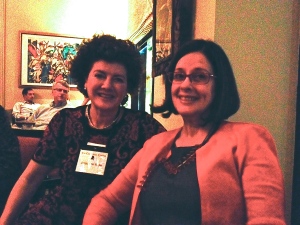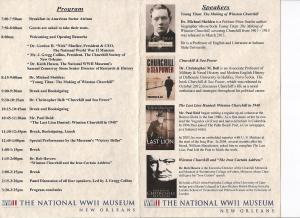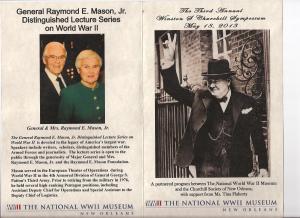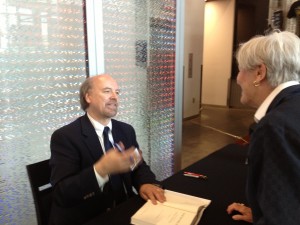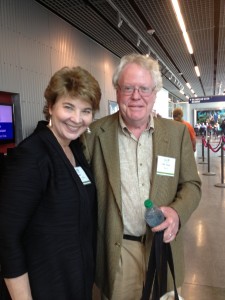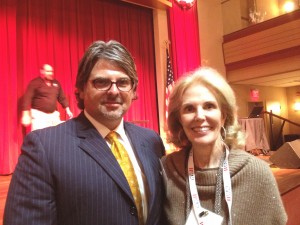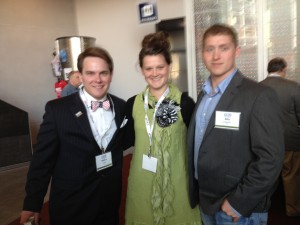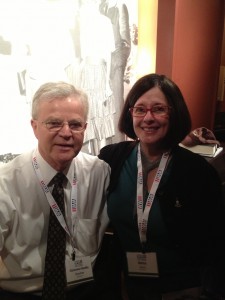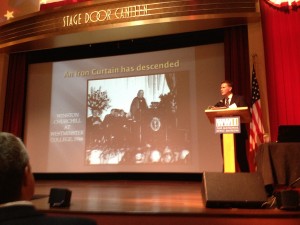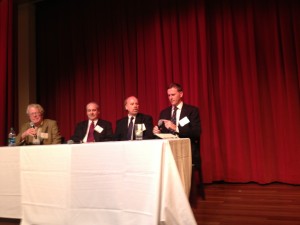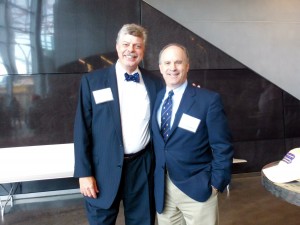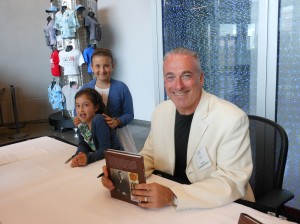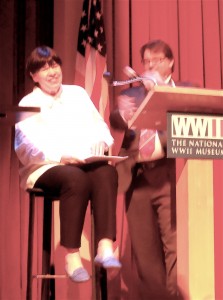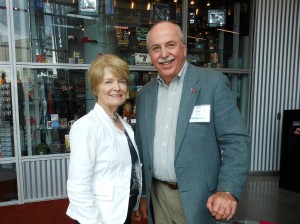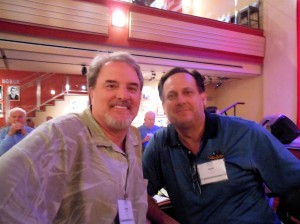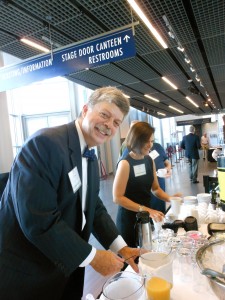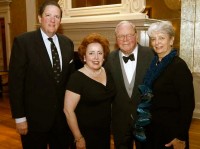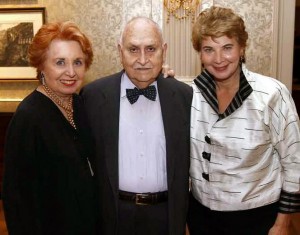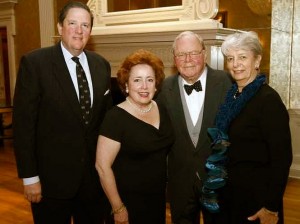INTERVIEW WITH WINSTON CHURCHILL
[At Podium] We now take you back to March 6, 1946. Yesterday, March 5, 1946, Winston Churchill made a major speech at Westminster College in Fulton Missouri. Still in the United States, Mr. Churchill has visited us for an exclusive interview. Although you may question the reality of Mr. Churchill’s appearance, I assure you that all the words you will hear from him are Winston Churchill’s actual words.
[Seated] Welcome, Mr. Churchill. At the age of 71, you can look back on a life of great achievement, as author, lecturer, and especially as Prime Minister of Britain during World War II. Last year the British to our surprise voted to replace you with Mr. Atlee as Prime Minister. Now that you are out of office, have you given any thought to retiring from politics?
Not until I am a great deal worse and the Empire a great deal better. (p 528)*
This is not your first visit to the United States, the country where your mother was born. Are you comfortable here?
What an extraordinary people the Americans are! Their hospitality is a revelation to me and they make you feel at home and at ease in a way that I have never before experienced. (p 124)
Do you have any complaints?
Toilet paper too thin, newspapers too fat! (p 129)
Tell us what your message was yesterday at Westminster College.
From Stettin in the Baltic to Trieste in the Adriatic, an iron curtain has descended across the Continent. Behind that line lie all the capitals of the ancient states of central and eastern Europe…and all are subject .. to a very high and, in many cases, increasing measure of control from Moscow. (p 10, 64)
* Page references are to pages of Churchill By Himself, edited by Richard Langworth (2008)
You paint a bleak picture. Do you think that a third world war is imminent or at least inevitable?
I repulse the idea that a new war is inevitable, still more that it is imminent…If we walk forward in sedate and sober strength seeking no one’s land or treasures; if all British moral and material forces and convictions are joined with your own in fraternal association, the high-roads of the future will be clear, not only for us but for all, not only for our time, but for a century to come. (p 10)
What do you think are Russia’s aims at this time?
I cannot forecast to you the action of Russia. It is a riddle wrapped in a mystery inside an enigma; but perhaps there is a key. That key is Russian national interest. (p 145)
I do not believe that Soviet Russia desires war. What they desire is the fruits of war and the indefinite expansion of their power and doctrines. (p 145)
How does one deal with a person like Stalin?
It’s no use arguing with a Communist. You can only deal with them on the following basis…by having superior force on your side—and they must also be convinced that you will not hesitate to use those forces if necessary in the most ruthless manner. That is the greatest chance of peace, the surest road to peace. (p 147
Mr. Churchill. I am 40 years old, do you think I will live to see the countries of Eastern Europe freed from the Communist yoke?
I won’t see its end but you will…. If you live your normal span you will assuredly see Eastern Europe free of communism. (p 500)
When we get to the 1980s we will see if your prediction has come true.
Now that you are in America, and in the home state of our president, Harry Truman, will you tell our audience what you think of him?
He is a man of immense determination. He takes no notice of delicate ground, he just plants his foot down firmly upon it. (p 375)
As I recall, you had a close relationship with his predecessor, Franklin Roosevelt, during World War II.
To encounter Roosevelt, with all his buoyant sparkle, his iridescent personality, and his sublime confidence, was like opening your first bottle of champagne. (p 371)
He was a great friend to us. He gave us immeasurable help at a time when we most needed it. (p 370)
You refer – I assume — to the Lend-Lease program, under which the United States gave aid to Britain when it otherwise stood alone against Hitler.
The end of our financial resources was in sight…The Lend and Lease Bill must be regarded without question as the most unsordid act in the whole of recorded history. (p 130-131)
It did take a while, however, before the United States acted—
Americans can always be trusted to do the right thing, once all other possibilities have been exhausted. (p 124)
How important is it that the United States do the right thing?
The United States stands at this time at the pinnacle of world power….with primacy in power is also joined an awe-inspiring accountability to the future. (p 134)
The price of greatness is responsibility. (p 134)
The Labor party is now in charge in Britain. How do you feel about its Socialistic tendencies?
The inherent vice of capitalism is the unequal sharing of blessings. The inherent virtue of Socialism is the equal sharing of miseries. (p 13)
Among our Socialist opponents there is great confusion. Some of them regard private enterprise as a predatory tiger to be shot. Others look on it as a cow they can milk. [cow-milking motion with hands] Only a handful see it for what it really is – the strong and willing horse that pulls the whole cart along. (p 392)
I suppose you hope to return to power at the next election.
I am not usually accused, even by my friends, of being of a modest or retiring disposition. (p 516)
But your opponents may remind the voters of mistakes you have made from time to time.
I have derived continued benefit from criticism at all periods of my life and I do not remember any time when I was ever short of it. (p 514)
In the course of my life I have often had to eat my words, and I must confess that I have always found it a wholesome diet. (p 486)
At any forthcoming General Election there may be an attempt to revive these former controversies…I consider that it will be found much better by all Parties to leave the past to history, especially as I propose to write that history myself. (p 64)
At the start of this interview, you mentioned the British Empire. You seem very fond of the concept of empire, but most people nowadays think that native populations should be free to govern themselves.
There has been no lack of critics to belittle Britain’s colonial achievement and to impugn her motives. But, look where you will, you will find that the British have ended wars, put a stop to savage customs, opened churches, schools and hospitals, built railways, roads and harbours, and developed the natural resources of the countries so as to mitigate the almost universal, desperate poverty.
The British have for long had one goal in view of their overseas territories: their ultimate development into nations freely associated within the Commonwealth framework. (p. 92)
India…
{Shout from the audience:] What are you going to do about those wretched Indians?
Before we proceed further, let us get one thing clear. Are we talking about the brown Indians in India, who have multiplied alarmingly under the benevolent British rule? Or are we speaking of the red Indians in America who, I understand, are almost extinct? (p 553)
Sir, you said during the War, “I have not become the King’s First Minister in order to preside over the liquidation of the British Empire.” (p 93) India is the largest piece of that empire, and now the Atlee government is apparently planning to withdraw entirely from India. What do you think of that?
India is a continent as large as and more populous than Europe, and not less deeply divided by racial and religious differences. (p 164)
The Government are apparently ready to leave the 400 million Indians to fall into all the horrors of sanguinary civil war – civil war compared to which anything that could happen in Palestine would be microscopic; wars of elephants compared with wars of mice. (p 164)
Regarding Palestine, do you support the establishment of a Jewish state there?
It is manifestly right that the Jews, who are scattered all over the world, should have a national centre and National home, where some of them may be reunited. And where else could that be but in this land of Palestine, with which for more than 3,000 years they have been intimately and profoundly associated? (p 175)
That was certainly British policy in the past, but now, in the year 1946, the Atlee government seems reluctant to allow the establishment of the new state of Israel, against the wishes of the Arabs in the area.
To abandon India, with all the dire consequences that would follow therefrom, but to have a war with the Jews in order to give Palestine to the Arabs, amid the execration of the world, appears to carry incongruity of thought and polity to levels which have rarely been attained in human history. (p 176)
Mr. Churchill, how do you make your living now that you are out of office?
All my life, or all the time that I have been out of public office – about half my life – I have earned my living by selling words.
I feel devoutly thankful to have been born fond of writing.(p 531)
Yes, I understand you have some big projects in the works: finish your History of the English Speaking Peoples, and write a History of World War II, as you did of World War I. It’s good you enjoy writing!
And what a noble medium the English language is. It is not possible to write a page without experiencing positive pleasure at the richness and variety, the flexibility and the profoundness of our mother-tongue. (p 51)
Do you have any suggestions for would-be authors?
Short words are best and the old words when short are best of all. (p 61)
What do you think is at the heart of a successful democracy?
…just the ordinary man who keeps a wife and family, who goes off to fight for his country when it is in trouble, goes to the poll at the appropriate time,…he is the foundation of democracy.. And it is also essential to this foundation that this man…
[Interjection from female audience member:] “And woman”
I beg pardon. The stock answer is that man embraces woman, unless the contrary appears in the context. (p 64)
There is no doubt that it is around the family and the home that all the greatest virtues, the most dominating virtues of human society, are created, strengthened and maintained. (p 517)
What do you see in the future, say 65 years from now, in the year 2011:
If the dangers of war and tyranny are removed, there is no doubt that science and cooperation can bring in the next few years to the world, certainly in the next few decades newly taught in the sharpening school of war, an expansion of material well-being beyond anything that has yet occurred in human experience…there is no reason except human folly or sub-human crime which should deny to all the nations the enjoyment of an age of plenty. (p 503)
You have accomplished so much. What do you think has been your greatest achievement?
My ability to persuade my wife to marry me was quite my most brilliant achievement. (p 511)
You appear quite healthy but I don’t have the impression that you get much exercise.
I get my exercise serving as pall-bearer to my many friends who exercised all their lives. (p 522)
Any final words? Especially for those who are downcast in these hard times?
What is the use of living, if it be not to strive for noble causes and to make this muddled world a better place for those who will live in it after we are gone? …And I avow my faith that we are marching toward better days. Humanity will not be cast down. We are going on – swinging bravely forward along the grand high road – and already behind the distant mountains is the promise of the sun. (p 526)
Thank you, Mr. Churchill
{N2366462.3} PAGE 1
